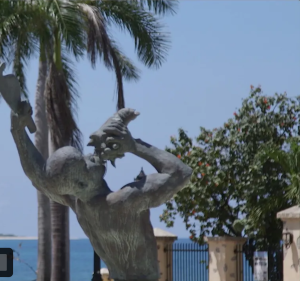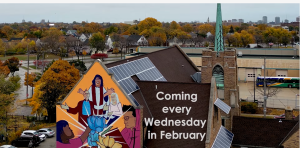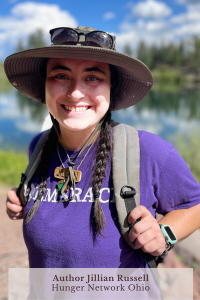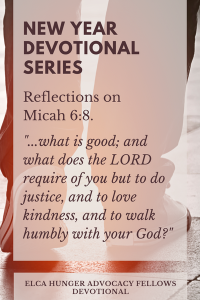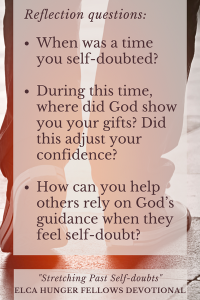Brian Hiortdahl, Sacramento, CA
Warm-up Question
What activity or pursuit do you stick with even though it is difficult for you to do?
Already
Dr. Maya Angelou (1928-2014) was a celebrated poet, author, teacher, filmmaker, and civil rights activist, among other roles and accomplishments. When interviewed upon being awarded the Presidential Medal of Freedom in 2011, Angelou reflected: “I’m always amazed when people walk up to me and say, “‘I’m a Christian.’ I think, ‘Already? You’ve already got it?’ I’m working at it…”
http://bingenow.com/video?vidid=1755
Discussion Questions
- What point do you think Angelou is making about being a Christian?
- Do you consider yourself a Christian? Why or why not? What does “being a Christian” mean to you?
- What aspect of Christianity are you working on … or, perhaps more accurately, how is Christ working on you?
Transfiguration of Our Lord
(Text links are to Oremus Bible Browser. Oremus Bible Browser is not affiliated with or supported by the Evangelical Lutheran Church in America. You can find the calendar of readings for Year A at Lectionary Readings.)
For lectionary humor and insight, check the weekly comic Agnus Day.
Gospel Reflection
Not long before they ventured up the mountain, Peter confessed for the first time that Jesus was “the Messiah, the Son of the living God.” (Matthew 16:16) This insight, which Jesus credits to his Father, is now validated by the Voice from the cloud. There is further validation from the presence of two legendary witnesses, Moses and Elijah. (For more about the importance of two witnesses, see: https://blogs.elca.org/faithlens/january-8-2016-real-fake/.) The details of the scene—radiance, Moses, Elijah, cloud, mountain, voice—combine to present an overwhelming testimony to the unrivaled authority of Jesus, which will be reinforced after his resurrection (Matthew 28:18).
Why now? Immediately after Peter’s confession, Jesus states for the first time that he must suffer greatly and be killed. When Peter protests, Jesus scolds Peter, who goes from “Blessed” to “Satan” in only 6 verses! Peter’s subsequent attempt to confine Jesus, Moses, and Elijah to permanent mountaintop glory reveals that he still doesn’t get it.
Peter is experiencing what Maya Angelou talked about. Understanding, accepting, and following Jesus is not easy. He says so many difficult things. Consider:
+ Turn the other cheek … give your coat also … go the second mile (Matthew 5:39-41)
+ Love your enemies, and pray for those who persecute you (Matthew 5:44)
+ Do not judge (Matthew 7:1)
+ I am sending you out like sheep into the midst of wolves (Matthew 10:16)
+ Whoever loves father or mother more than me is not worthy of me (Matthew 10:37)
+ If any wish to come after me, let them deny themselves and take up their cross and follow me (Matthew 16:24)
You get the idea: it’s crazy hard.
Perhaps that explains why the Voice from the cloud said “listen to him!” The Greek verb communicates continuing action: “keep listening to him!” It’s not a one-and-done; it’s an ongoing assignment and commitment. Martin Luther understood this. The first of his ninety-five theses states it clearly: “When our Lord and Master Jesus Christ said, “Repent,” [Matt 4:17], he willed the entire life of believers to be one of repentance.”
At this turning point in the gospel, it’s especially crucial for God to overcome Peter’s selective hearing (and ours) about what being the Messiah means, so God sets off extra fireworks to get our attention. God is making sure we all get it: keep listening to him! Don’t resist the cross. Don’t tune Jesus out when he says what we don’t want to hear. Don’t quit when it gets hard. Stick with it. Stick with him. And as you struggle along the difficult way of Jesus, keep listening to one more thing he says: “Rejoice and be glad, for your reward is great in heaven.” (Matthew 5:12)
Discussion Questions
- What saying of Jesus is the hardest for you to accept and to live?
- What daily practice helps you to “keep listening” to Jesus?
- When have you been overwhelmed by glory? What did you learn from that amazing experience?
Activity Suggestions
- Learn more about Maya Angelou and/or other Black saints and witnesses during February (Black History Month). Groups can create a list of names, assign one name to each participant, then have each participant share a brief biography and a quote from that person.
- Read the Sermon on the Mount (Matthew 5-7) and select one sentence to post in your room on Ash Wednesday (February 22). Read that sentence every day in Lent and let it work on you as you work on it.
Closing Prayer
Open our ears, Lord. We want to hear Jesus, especially when we don’t. Amen.



